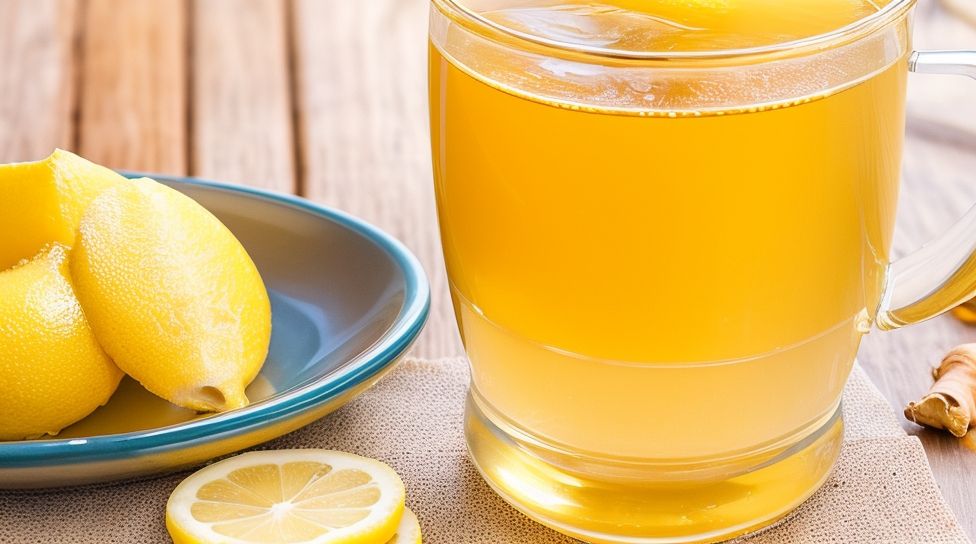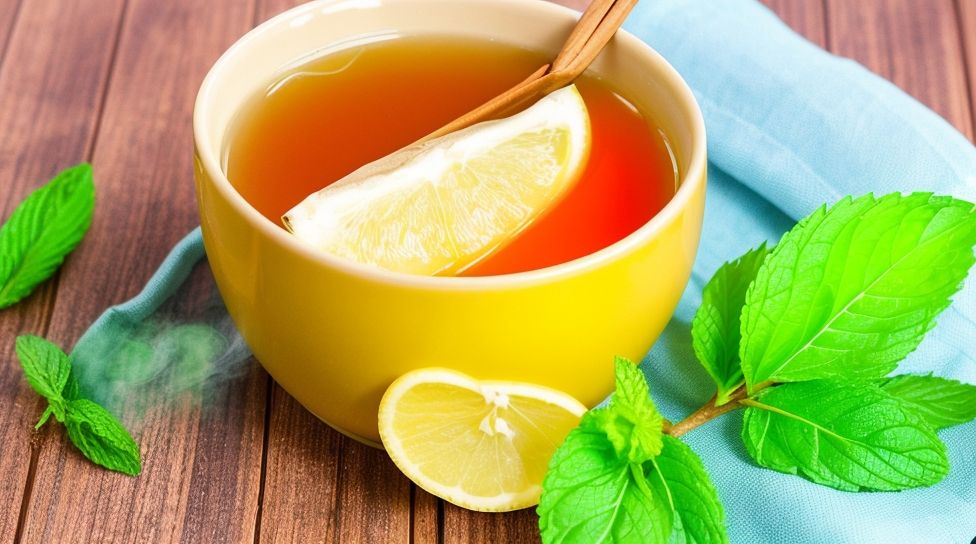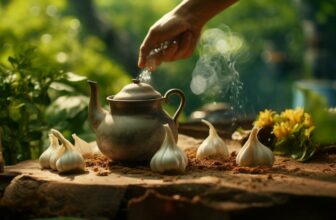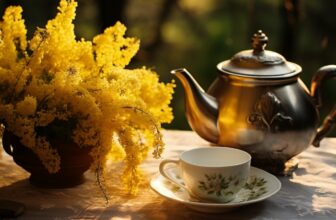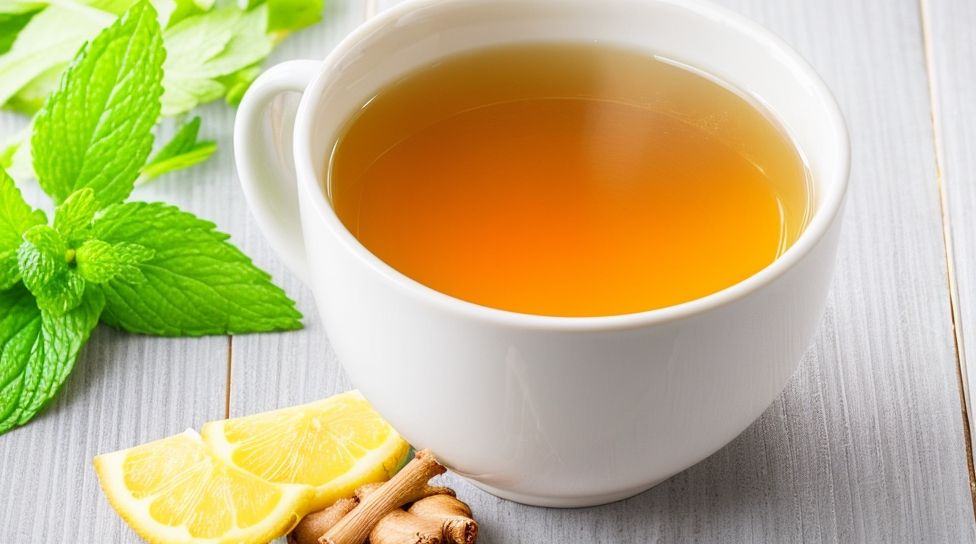
Ginger tea is a popular and refreshing beverage known for its delightful taste and numerous health benefits. This article will explore the various advantages of consuming ginger tea, as well as provide a simple recipe for preparing it at home.
Ginger tea offers a range of health benefits that make it a staple in many households. Some of the key benefits include:
- Relieves Nausea and Digestive Discomfort: Ginger tea is well-known for its ability to alleviate nausea, motion sickness, and digestive issues such as indigestion and bloating.
- Reduces Inflammation: The anti-inflammatory properties of ginger can help reduce inflammation in the body, making ginger tea a great choice for those suffering from inflammatory conditions.
- Boosts Immune System: Ginger tea is rich in antioxidants and can help strengthen the immune system, protecting the body against various infections and diseases.
- Manages Chronic Pain: Ginger has natural pain-relieving properties and can help manage chronic pain conditions such as arthritis and migraines.
Now that we know the health benefits of ginger tea, let’s move on to how it can be prepared at home. By following a simple recipe, you can enjoy the goodness of ginger tea in the comfort of your own home. This section will discuss the step-by-step process of making ginger tea, from gathering the ingredients to brewing the perfect cup. we will explore some flavor variations that can be added to customize your ginger tea. Finally, we will provide some tips to ensure you make the perfect cup of ginger tea every time. So, let’s get started and learn how to make this invigorating and beneficial beverage.
Key takeaway:
- Ginger tea relieves nausea and digestive discomfort: Drinking ginger tea can help alleviate symptoms of nausea and digestive issues, providing relief and promoting better digestion.
- Ginger tea reduces inflammation: The anti-inflammatory properties of ginger can help soothe inflammation in the body, making ginger tea a natural remedy for pain and swelling.
- Ginger tea boosts the immune system: Consuming ginger tea regularly can strengthen the immune system, helping the body fight off infections and promote overall health.
- Ginger tea manages chronic pain: Those suffering from chronic pain can find relief by incorporating ginger tea into their daily routine, as it has been known to have analgesic properties.
- Preparing ginger tea at home: To make ginger tea, gather the ingredients, select fresh ginger, prepare the ginger root, brew the tea, and add flavor variations to customize the taste.
- Tips for making the perfect ginger tea: To enhance the flavor of ginger tea, consider adding honey or lemon, adjusting the brewing time and ginger-to-water ratio, and experimenting with different spices.
Health Benefits of Ginger Tea
Photo Credits: Www.Teamastershub.Com by Gabriel Johnson
Sip on some ginger tea and unlock a world of health benefits! From soothing your stomach to fighting inflammation, this section will take you on a journey to explore the amazing perks of ginger tea. Discover how it relieves nausea and digestive discomfort, reduces inflammation, boosts your immune system, and even manages chronic pain. Get ready to embrace the power of ginger and improve your well-being one cup at a time!
Relieves Nausea and Digestive Discomfort
Ginger tea is renowned for its ability to relieve nausea and digestive discomfort. The natural compounds found in ginger, including gingerol, help to ease muscle tension in the gastrointestinal tract, thus reducing nausea and improving digestion. Various studies have demonstrated that ginger tea can be just as effective as over-the-counter medications in alleviating nausea caused by morning sickness, chemotherapy, or surgery.
To prepare ginger tea at home, start by gently peeling and thinly slicing fresh ginger root. Bring one cup of water to a boil and then add the ginger slices. Allow the mixture to simmer for approximately 10 minutes, allowing the flavors to meld. If desired, you can enhance the taste by adding a squeeze of lemon or a teaspoon of honey. Strain the tea, and it is then ready to be consumed.
When using ginger tea to alleviate nausea and digestive discomfort, it’s important to note that individual tolerances may vary. Begin with a small amount and gradually increase the quantity as necessary. If symptoms persist or worsen, it is advisable to seek guidance from a healthcare professional.
Historically, ginger tea has been utilized for centuries as a natural remedy for various ailments due to its anti-inflammatory and antioxidant properties. Alongside its capacity to relieve nausea and digestive discomfort, it may also aid in reducing inflammation, enhancing the immune system, and managing chronic pain.
Reduces Inflammation
Ginger tea is renowned for its ability to naturally reduce inflammation in the body. The active compounds found in ginger, including gingerol and zingerone, possess powerful anti-inflammatory properties that effectively alleviate inflammation.
Regular consumption of ginger tea can effectively decrease inflammation caused by various conditions such as arthritis, osteoarthritis, and rheumatoid arthritis. Moreover, it is also beneficial for reducing inflammation in the digestive system, therefore providing relief from symptoms associated with inflammatory bowel disease and gastritis.
To prepare ginger tea, begin by selecting fresh ginger root and meticulously peeling and slicing it into thin pieces. Boil the ginger slices in water for approximately 10 minutes to extract the valuable compounds. Strain the tea and consider adding a hint of honey or lemon for enhanced flavor.
For optimal results in harnessing the anti-inflammatory benefits of ginger tea, it is recommended to consume it on a daily basis. Drinking 2-3 cups of ginger tea per day can significantly alleviate inflammation and its related discomfort.
In addition to incorporating ginger tea into your routine, it is crucial to maintain a healthy lifestyle and include other anti-inflammatory foods in your diet. Regular exercise and the practice of stress management techniques can also aid in reducing inflammation throughout the body.
By incorporating ginger tea into your daily routine, alongside other beneficial habits, you can effectively contribute to reducing inflammation and promoting overall well-being.
You’ll be ready to take on any virus that comes your way after a cup of ginger tea.
Boosts Immune System
Ginger tea is known for its ability to boost the immune system, promoting overall well-being and proficiency in fighting off illnesses and infections. There are several ways in which ginger tea can improve the immune system:
- Antioxidant-rich: Ginger contains powerful antioxidants that combat free radicals and protect the body against oxidative stress, ultimately strengthening the immune system.
- Anti-inflammatory properties: Ginger tea possesses natural anti-inflammatory properties that reduce inflammation in the body, thereby supporting a stronger immune system.
- Antimicrobial effects: Ginger has antimicrobial properties that help in the fight against harmful bacteria and viruses, preventing infections and bolstering the immune system.
- Improved circulation: Studies have indicated that ginger improves blood circulation, facilitating the transportation of immune cells throughout the body. This enhancement enables the immune system to effectively detect and combat pathogens.
- Stress reduction: Chronic stress weakens the immune system, but ginger tea has calming properties that effectively reduce stress levels, thereby supporting a healthier immune response.
Incorporating ginger tea into your daily routine is a natural and delicious way to boost your immune system and promote overall wellness.
Manages Chronic Pain
Ginger tea is a natural remedy that effectively manages chronic pain. It offers a holistic approach to pain management by targeting the underlying cause of pain. The active compounds in ginger, such as gingerol and shogaol, have anti-inflammatory properties that help alleviate pain in conditions like arthritis, muscle soreness, and migraines. By reducing inflammation and inhibiting the production of inflammatory molecules, ginger can provide significant relief from chronic pain.
To prepare ginger tea for chronic pain relief, start by selecting fresh ginger root. Peel and slice the ginger into thin pieces. Then, add the ginger slices to boiling water and let it simmer for 10-15 minutes. Strain the tea and sweeten it with honey or lemon if desired. To maximize the pain-relieving benefits, it is recommended to drink ginger tea daily. Consuming 2-3 cups of ginger tea throughout the day can provide consistent relief from chronic pain. However, it is important to consult with a healthcare professional if you have any underlying health conditions or if you are already taking medication for pain management.
Incorporating ginger tea into your routine can be a natural and effective way to manage chronic pain. Its anti-inflammatory properties and soothing effects make it a valuable addition to your pain management plan.
Preparing Ginger Tea at Home
Photo Credits: Www.Teamastershub.Com by George Ramirez
Get ready to embark on a flavorful journey as we dive into the art of preparing ginger tea at home. From gathering the essential ingredients to brewing the perfect cup, we’ll explore the ins and outs of crafting this delightful beverage. Along the way, we’ll reveal insider tips for selecting the freshest ginger and adding enticing flavor variations. So, grab your favorite mug and get ready to experience the aromatic and invigorating world of homemade ginger tea. Cheers to a soothing and delightful brew!
Gather the Ingredients
To gather the ingredients for making ginger tea, you can follow the steps mentioned below:
- Gather the fresh ginger root: It is important to choose a firm and smooth-skinned piece of fresh ginger root. Make sure to avoid any ginger that is shriveled or has soft spots.
- Gather the water: For the best taste, make sure to use clean, filtered water.
- Gather the sweetener (optional): If desired, you can gather honey or sugar to sweeten the ginger tea according to your preference.
- Gather the lemon or lime juice (optional): Adding a squeeze of fresh lemon or lime juice can further enhance the flavor of the ginger tea.
Fact: Ginger, which has been used for centuries as a medicinal spice, offers various health benefits including reducing nausea and inflammation.
Selecting Fresh Ginger
When selecting fresh ginger for your ginger tea, make sure to follow these tips to ensure you choose the best flavor and quality:
- Look for firm texture: It is important to choose ginger roots that have a firm and solid texture when touched. Avoid any roots that feel soft or mushy as they are not fresh and might have started to deteriorate.
- Check for smooth skin: Fresh ginger should have smooth skin without any wrinkles or blemishes. Wrinkled or damaged skin can be an indication of old or spoiled ginger.
- Choose a vibrant color: The color of fresh ginger should be bright and lively, with a yellowish or tan hue. Avoid ginger with dull or dark patches as it may be older and less flavorful.
- Smell the aroma: To determine the quality of fresh ginger, sniff the root and check for a strong, spicy, and pungent aroma. If it smells fresh and aromatic, it is a good indicator of its quality.
- Opt for organic ginger: Whenever possible, go for organic ginger to avoid any potential exposure to pesticides or other chemical residues.
By following these tips, you can ensure that you select the freshest and most flavorful ginger for your homemade ginger tea.
Prepare to unleash the power of ginger by mastering the art of preparing the almighty ginger root!
Preparing Ginger Root
When preparing ginger root for making ginger tea at home, follow these steps:
- Start by selecting fresh ginger root. Look for roots that are firm and smooth, with no signs of mold or wrinkles. Fresh ginger will have a strong aroma.
- Once you have the ginger root, use a clean knife or peeler to remove the outer skin. You can scrape off the skin gently or slice it off, depending on your preference.
- After removing the skin, cut the ginger root into thin slices or small pieces. This will make it easier to infuse the flavor into the tea.
- Next, bring a pot of water to a boil. The amount of water will depend on how many cups of ginger tea you want to make. As a general guide, use 1 cup of water for each serving.
- Add the sliced or chopped ginger root to the boiling water. Let it simmer for about 10 minutes to allow the ginger flavor to infuse into the water.
- After simmering, strain the ginger tea to remove the ginger pieces. You can use a sieve or a teapot with an infuser to strain the tea effectively.
- Your ginger tea is now ready to be served. You can enjoy it as is or add honey, lemon, or other flavorings according to your preference.
By preparing ginger root in this way, you can brew a delicious and aromatic ginger tea at home.
Brewing the Ginger Tea
- To brew the perfect ginger tea, follow these steps:
- Gather the ingredients: You will need fresh ginger root, water, and optional ingredients like lemon or honey.
- Selecting fresh ginger: Choose ginger root that is firm and free from mold or blemishes. Fresh ginger will have a strong aroma.
- Preparing ginger root: Peel the ginger using a spoon or knife, then slice it into thin pieces or grate it.
- Brewing the Ginger Tea: Bring water to a boil in a saucepan. Add the ginger slices or grated ginger to the boiling water and let it simmer for about 10 minutes. For a stronger flavor, simmer for longer.
- Adding flavor variations: If desired, add a squeeze of lemon juice or a drizzle of honey to enhance the taste of the ginger tea.
Pro-tip: You can adjust the strength of the ginger tea by adding more or less ginger to the water. Experiment with different amounts to find your preferred level of spiciness. Enjoy the soothing and aromatic ginger tea by sipping it slowly and savoring its natural goodness.
Spice up your ginger tea with these flavor variations and ask your taste buds, ‘ginger or ging-gone?’
Adding Flavor Variations
- 1. Citrus Twist: Incorporate flavor variations by adding a slice of lemon or orange to your ginger tea. This will provide a refreshing citrus flavor that complements the spicy taste of ginger perfectly.
- 2. Minty Fresh: Enhance the taste of your ginger tea by infusing it with a few fresh mint leaves. This will create a cool and invigorating twist, adding a refreshing aroma and a touch of sweetness to balance the heat of the ginger.
- 3. Honey and Ginger: Customize your ginger tea by sweetening it with a teaspoon of honey. This natural and soothing flavor variation helps mellow the spiciness of the ginger, resulting in a harmonious taste.
- 4. Spiced Delight: Elevate the warmth of your ginger tea by adding a pinch of cinnamon or a sprinkle of nutmeg. These spices offer a cozy and comforting flavor profile, which is perfect for chilly days.
- 5. Floral Experience: Experiment with floral flavors by incorporating a few petals of dried lavender or rose to your ginger tea. The delicate aromas of these flowers bring a subtle and aromatic dimension to your tea.
By adding these flavor variations, you can customize your ginger tea according to your taste preferences. Whether you prefer a zesty citrus kick, a refreshing minty sensation, a touch of sweetness, a cozy spiced twist, or even a hint of floral elegance, these additions will enhance your ginger tea experience. Feel free to try different combinations to discover your favorite flavor fusion.
Tips for Making the Perfect Ginger Tea
Photo Credits: Www.Teamastershub.Com by Andrew Jackson
To make the perfect ginger tea, consider these helpful tips:
- Choose Fresh Ginger: Opt for fresh ginger root rather than powdered ginger for the best flavor and aroma. Look for ginger with smooth skin and a firm texture.
- Peel and Slice the Ginger: Use a spoon or a vegetable peeler to remove the outer skin of the ginger root. Slice the ginger into thin, coin-like pieces to maximize the flavor extraction.
- Use Filtered Water: Start with fresh, filtered water to ensure a clean and pure taste. Avoid using tap water that may contain impurities.
- Bring Water to a Boil: Place the sliced ginger in a saucepan and add the desired amount of water. Bring the water to a rolling boil over high heat.
- Simmer for Flavor: Once the water reaches a boil, reduce the heat to low and let the ginger simmer for about 10-15 minutes. This allows the ginger to infuse its flavor into the water.
- Add Sweeteners: If desired, you can add natural sweeteners like honey, maple syrup, or stevia to enhance the taste. Adjust the sweetness according to your preference.
- Strain and Serve: After simmering, strain the ginger tea using a fine-mesh sieve or a tea strainer to remove the ginger pieces. Pour the tea into a cup or mug and enjoy.
- Experiment with Flavor Enhancements: Get creative with your ginger tea by adding other flavor enhancers like lemon slices, fresh mint leaves, or a cinnamon stick. These additions can add depth and complexity to the taste.
- Adjust the Strength: If you prefer a stronger ginger flavor, increase the amount of ginger slices or extend the simmering time. For a milder taste, reduce the ginger or simmer for a shorter duration.
- Store Leftovers: If you have leftover ginger tea, allow it to cool and store it in the refrigerator in a sealed container. It can be consumed cold or reheated later.
By following these tips, you can create a delicious and refreshing cup of ginger tea that suits your taste preferences.
Some Facts About Ginger Tea Recipe:
- ✅ Ginger tea is a warm and soothing drink that has been consumed for centuries. (Source: Our Team)
- ✅ It is a non-alcoholic, non-caffeinated, and virtually calorie-free drink, making it a great option for those cutting back on these substances. (Source: Cookie and Kate)
- ✅ Ginger tea aids digestion, soothes upset stomachs, and can reduce nausea, making it a possible remedy for morning sickness. (Source: Cookie and Kate)
- ✅ Ginger tea contains compounds like gingerol that have anti-inflammatory properties and can inhibit chronic inflammation, which is linked to conditions like cancer and heart disease. (Source: Dr. Axe)
- ✅ Variations of ginger tea can be made by adding ingredients like cinnamon, turmeric, or mint, which can offer additional flavors and health benefits. (Source: Cookie and Kate)
Frequently Asked Questions
How do you make ginger tea?
To make ginger tea, thinly slice one inch piece of fresh ginger and bring it to a boil with fresh water in a saucepan. Reduce the heat to a simmer for 5 minutes, then strain the tea through a fine sieve. You can customize the flavor by adding optional ingredients like cinnamon sticks, fennel seeds, or fresh turmeric.
What are the health benefits of ginger tea?
Ginger tea has numerous health benefits. It contains gingerol, a compound with anti-inflammatory and antioxidant properties. This makes it beneficial for conditions like nausea, colds, flus, pain, high blood pressure, high cholesterol, and diabetes. It has also been studied for its potential benefits in treating neurodegenerative diseases like Alzheimer’s and Parkinson’s.
Can ginger tea help with digestive issues?
Yes, ginger tea is known to aid digestion and soothe upset stomachs. It is considered a natural remedy for digestive issues such as nausea and can be a possible remedy for morning sickness. However, it is a good idea to consult a doctor if you have concerns about consuming ginger tea.
How long can you store ginger tea?
Ginger tea can be stored in the refrigerator for up to 1 week. It is advised to store it in a sealed container to maintain its freshness and flavor.
Can ginger tea be enjoyed as a warming drink in cold weather?
Absolutely! Ginger tea is a popular choice for warming up on chilly days. It can be enjoyed as a bedtime or morning tonic, a soothing drink for a sore throat, or a relaxing evening sipper.
Are there any side effects of consuming ginger tea?
While ginger tea is generally safe for most people, consuming excessive amounts of ginger may cause stomach upset or heartburn in some individuals. It is always recommended to consume in moderation and if you have any existing medical conditions, it is best to consult with a healthcare professional before adding ginger tea to your diet.
